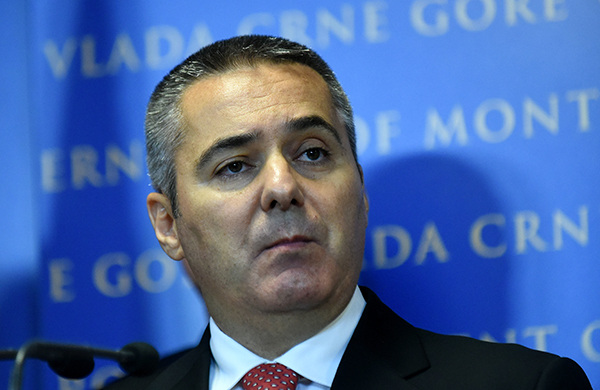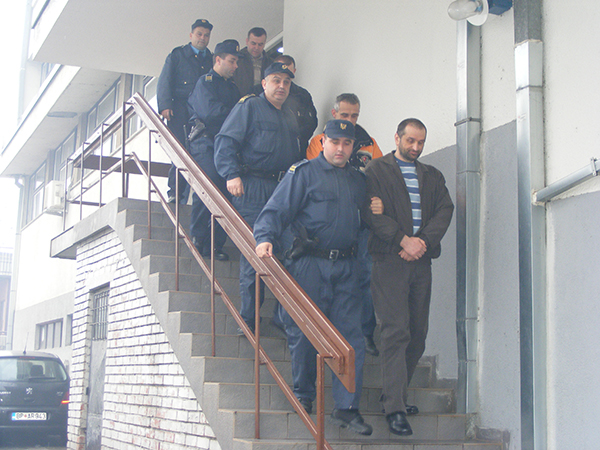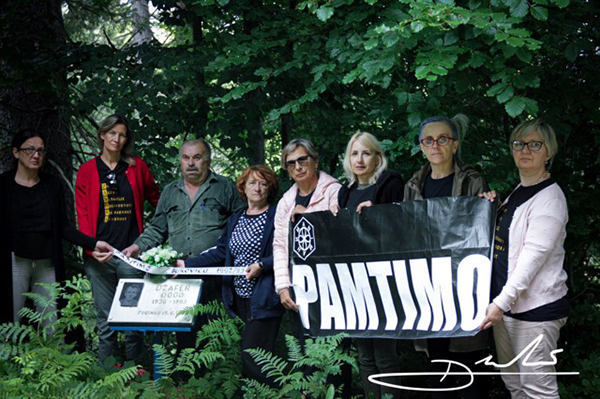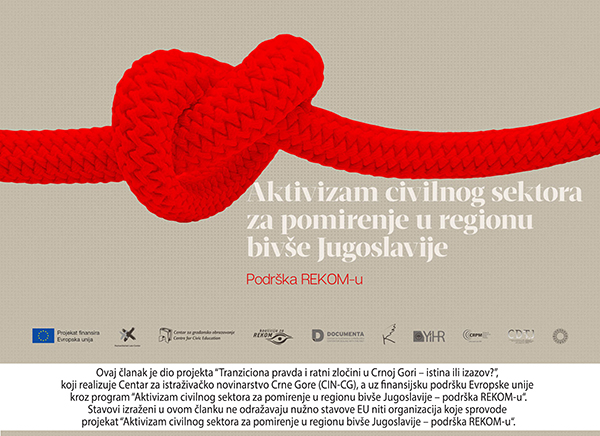ATROCITIES AND EXPULSIONS OF BUKOVICA MUSLIMS- NO JUSTICE IN SIGHT WHILE POLICE DIRECTOR VELJOVIC CLIMBS THE LADDER

The High Court acquitted the defendants while the Appellate Court and the Supreme Court went even farther and ruled that no crime took place at all. Many years on, the government, in order to redeem itself, poured millions in the construction of new houses in Bukovica, to which no one returns except briefly, to vote in elections. Veselin Veljovic, the current director of National Police, was in the centre of the story as he was the chief of Pljevlja Police Department in the days of trouble. His role in the crimes has not been fully brought to light while his testimonies are controversial.

Six persons were killed, two committed suicide as a consequence of abuse and torture while hundreds of Muslims were expelled and their houses looted. All that took place in the early 1990s. The authorities in Montenegro and its top officials are still not ready to face the past in the way that would show responsibility by bringing the guilty to justice.
A small number of those who were indicted by the prosecution were later acquitted in court. The judiciary went even that far as to rule that no crime took place. Contradicting testimonies failed to clarify the role of the current National Police Director Veselin Veljovic, who back then was heading the police department in Pljevlja. Veljovic claims that his actions were lawful.
As in other similar cases, the authorities tried to cover up the atrocities by throwing money around. Some €4.5 million have been invested to build 110 houses and about 60 additional facilities in the area over the recent years. Allegedly, the goal is to revitalise the area. However, only six families live there around the year. The government didn’t answer the Centre for Investigative Reporting (CIN-CG) on whether it was pleased with the progress and results of the investment.
The representative of the Bukovica Association Jakup Durgut says that “the Government has accomplished nothing. The people have not returned. A number of them has yet to pick the keys to the new houses. Out of eight families who did return, two have left again. This people need support. The state has to guarantee the purchase of agricultural products and to maintain the roads. This ain’t place for living” Durgut told CIN-CG.
At the outset, there was an optimism, he says, but as time went on, the people realised that it was a waste of money. “I doubt that they have invested that much as they report. Many houses are still even without electricity. There is no transparency in this. It’s a lousy work.
In his book, Bukovica 1992-1995: Ethnic Cleansing, Crimes and Violence, the place is described as the only part in Montenegro which suffered ethnic cleansing in the 1990s. It states that in early 1992 twenty four villages were emptied of their population . From 1992 to 1995, six civilians were killed: Hajro Muslic (75), Ejub Muslic (28), Latif Bungur (87), Hilmo Drkenda (70), Dzafer Djogo (57) and Bijela Dzaka (70). Eleven men were abducted and taken to prison in Cajnice accross the border. Himzo Stovrag (67) and Hamed Bavcic (75) committed suicide after torture that they were subjected to. Almost the entire male population of the area was beaten up repeatedly. At least eight houses and the village mosque were burnt down and property looted. Other houses were destroyed as well. Some 125 families with 330 members were displaced.
Only the case of Dzafer Djogo, who worked on the maintenance of local roads ended up in court. However, the prosecutor labelled it as manslaughter, not a war crime. Majos Vreco was convicted while his accomplice Dragomir Krvavac was acquitted on insanity clause. The District Court in Bijelo Polje sentenced Vreco to 4.5 years in prison. Subsequently the High Court in Bijelo Polje increased the sentence to 14 years. Vreco served his sentence in Spuz Correctional Centre and in Foca Correctional Centre in Bosnia. While in prison, his sentence was reduced twice – the then Republic of Srpska President Nikola Poplasen reduced his sentence by ten months upon amnesty law and Montenegro's President Milo Djukanovic reduced his sentence by two years.
The mysterious role of police chief
“I don’t know how much he was personally involved, but he knew (what was going on) and he could have stopped it” says Durgut on the role of the then local police chief Veselin Veljovic. Allegations about Veljovic’s role in those events are contradictory, even though they come from the Bosniaks. Some witnesses in court said that Veljovic was leading the house searches. Durgut further quotes in his book a person who claimed that Veljovic had threatened to cut off his ears. On the other hand, in January 2006 after Veljovic was first time appointed director of National Police many raised concerns over his role in the Bukovica Case. Smail Hakija Ajanovic, the then chairman of the Pljevlja Islamic Community came to his rescue and said that Veljovic preserved peace and dignity of the people in Pljevlja and that no one else could have contributed more.
“Only lawful actions were taken to ensure stability, order and peace. The community was mixed thus particular efforts were made to preserve the multi-ethnic and religious harmony in the area“ is said in the reply of National Police to CIN-CG about Veljovic’s involvement back then. We sent questions to Director Veljovic on how he viewed his role in those events, whether he felt responsible for torture and expulsions, whether he personally took part in the same, whether he, as a policeman, found the perpetrators and whether the victims got justice. Instead of answering our specific questions we were referred to the letter of Ajanovic who, according to National Police, “denied the later attempts to tarnish the name and integrity of Police Director Veselin Veljovic as they were unfounded and malicious when it comes to the events in Bukovica. Ajanovic further explained the great contribution of the Veljovic-led police in preserving peace in those troublesome days”. The police reply ends with “Police Director Veselin Veljovic shared all his knowledge and findings in the court proceeding whereupon the defendants were acquitted of criminal responsibility”.
Veljovic was heading the police in Pljevlja from mid-October 1992 until the end of 1995. He testified in court in December 2010. He said that the proximity of Bosnia and Republic of Srpska and the raging hostilities in the area posed a security threat to both Muslims-Bosniaks and Orthodox. He also said that there were many paramilitary formations around, so the locals were rightfully concerned. The police had duty to keep things quite. He didn’t rule out a possibility of individual excesses on the part of police officers, but affirmed that the police was “a factor of stability, peace and order and it took action in search for illegal weapons hidden in houses or in relation to other criminal offences”.
“No police officer involved in those raids abused and mistreated the persons whose houses and facilities were searched, because none of the residents in Bukovica complained to me about the work and behaviour of the accused police officers ... It is clear to the police that SH hanged himself , but not out of fear or because he was petrified or beaten by the army and the police. He hanged himself for the reasons known to him only” said Veljovic in court.
Ramiz Sabanovic from the village of Klakorine gave his testimony to the Humanitarian Law Center (HLC) which was published in HLC’s book on Bukovica. It contradicts Veljovic’s version of events. He said that in February 1993, a group of soldiers and police officers toured Muslim homes and harassed the population. He says that soldiers and police broke into his house, dragged his wife Hatidja by the hair and knocked her down to the floor while he was beaten in another room and asked to show his money. He held up a wad of dinars in the countervalue of some 3,000 Deutschmarks which he earned from the sale of livestock. The officer examined the money but did not take it.
“Then a soldier with a dog approached me, I think his name was Aco Malinic. He released the dog which jumped on my chest and completely shredded my clothes but he kept it on the leash just enough to stop him short of killing me. The stress I suffered is beyond words to describe. After this, my wife and I were forced to make the sign of the cross on us and sing Chetnik (Serbian nationalist) songs and lick the knife blade. Afterwards, they drove us out of the house and chased us to a nearby stream saying that we either surrender our money or get slaughtered with barbed wire”- says Sabanovic.
Regarding the role of the police chief, a well-known TV Vijesti journalist Sead Sadikovic, who made numerous reports and a film about Bukovica, told CIN-CG, with distinctive irony that “Nothing but God’s providence sent Veselin Veljovic to Bukovica in the early 1990s. After the army left he controlled the area and it was then that most people moved out and saved their lives. Today they are in Gorazde, Sarajevo, Vienna, New York. As the war was spilling from Bosnia over to Bukovica, Veljovic was aware that he could not protect the Bosniaks. Thus he expelled them, but those are not my words though. I will be more precise and cautious: He helped him to go to a safer and better place - to exile. So the Bukovica Muslims should be grateful to the present police director. Even if he mildly spanked someone while he searched the houses for alleged illegal weapons that was for their own good, he meant no harm whatsoever”.
The courts turn blind to war crimes
In December 2007, the High Prosecution Office in Bijelo Polje launched an investigation on five former Yugoslav Army soldiers: Radmilo Djukovic, Radisa Djukovic, Slobodan Cvetkovic, Djordje Gogic, Milorad Brkovic and two Montenegrin police officers: Slavisa Svrkota and Radoman Subaric. After three years they were indicted for war crimes and subsequently fully acquitted.
The prosecution accused them of inhumane treatment, torture and violence they committed against Muslims during the raids of their houses in search for alleged illegal weapons.
The indictment stated that “they were checking whether the people fought in the Bosnian Green Berets, whether they offered the Green Berets shelter and food supply. The accused caused severe suffering and posed a threat to the lives and integrity of victims, intimidated them so to force them out of their houses and cause all the Muslims to leave the area”. The policeman were accused that they drove Himzo Stovrag to hang himself to escape further abuse and torture.
[youtube v="YwFPY-Xlphc"]
The trial chamber at the Bijelo Polje High Court, presided by Judge Sefkija Decevic, acquitted them for lack of evidence. The court ruled that the Muslim community had left on its own because of the war in their proximity and not because of inhumane treatment on the part of the defendants. Serbs and Montenegrins left their homes as well. The ruling also says that some of the victims did not support the allegations of the indictment, while some spoke differently than in the investigation. It was also found that the army and the police acted “in accordance with the rules of service”, that the search of the houses was justified, because there were tips that weapons were hidden in some houses which were subsequently found, and their owners convicted of illegal possession of firearms.
The High Court concluded that no systematic or widespread attack on civilians had been proven, which is a prerequisite for the existence of a crime against humanity. The Appellate Court reversed the verdict two years later, acquitting the accused, but on the grounds that no crime at all was committed.
“The crime as presented in the indictment is not a crime, because it lacks one essential element - the rule of international law which the defendants broke“- as explained by Judges Radmila Mijuskovic, Milic Medjedovic and SvetlanaVujanovic . “The Rome Statute of the International Criminal Court, to which the Prosecutor relied in the Indictment, is not such an one, since the acts listed in the indictment were committed in 1992 and 1993, which was before the Rome Statute came into force (2002)” is further explained. The Supreme Court upheld the ruling in January 2013.
Sadikovic: They remake history with our tax money
Sadikovic says Bukovica research is one of the saddest he has done. “At first it was because of sad stories told by the victims. Then came the trial which was nothing but a farce. Lastly, the epilogue is tragicomic: “The victims come back and vote for their jailer, in all elections. They are won by a cottage in the middle of nowhere where they won’t bother to stay except on the very special ocassion- on the election day to give their vote to the former jailer” says Sadikovic.
Our tax money is used to re-write history, he says. Sadikovic’s film The Void shows people who come to Pljevlja from abroad to give their vote to Democratic Party of Socialists (DPS) even though their families were tortured and abused by the same people who were in power then and now.
“The state planned to give away €4.5 million. Add the litigation costs and we arrive at €5-6 million of our tax money used to re-write biographies of those who ‘created the new Montenegro’”. This case will never be properly investigated as long as we have these guys in power” said Sadikovic.
He says that during his stay in Bukovica he was shocked to find out that both parties (victims and perpetrators) now behave as though nothing happened before.
“This is the key mistake! I’m afraid that it will happen. Those who learn not from history are doomed to repeat it. The remaining stigma prevents newer generations to learn from the past so to ensure that it never comes back. It’s funny when they say that the statute of limitations shall not apply to war crimes” concluded the well-known journalist.
In the interview with CIN-CG, lawyer Velija Muric said that Bukovica was “a war crime case that occurred in the area where no state of war was officially declared”.
“Many things were done so to de facto encourage the flight of the local population. The army and the police didn’t commit all the atrocities but they left the door open so that Bosniaks could easily fall prey to their local Serbian and Montenegrin neighbours. Some were found guilty of manslaughter but not of war crime against civilians and destruction of houses and mosques. Displacing the citizens of other ethnicity and faith, looting their property and killing innocent people is equal to genocide or ethnic cleansing” said Muric. He points our that a large number of Bosniaks fell prey to police brutality at the time.
“My objection to Montenegro is that it hasn’t investigated and identified those who either took part or failed to prevent the crimes in Bukovica. On the contrary, it happens that the responsible get promoted to high positions in the police. That will discourage anyone who contemplates to return. Without facing the past and dealing with the crime, things like investments in new houses for Bosniaks are absurd” concludes Muric.
Director of the Human Rights Action (HRA) Tea Gorjanc Prelevic points out that the Appellate Court’s ruling on the Bukovica Case is controversial. It’s a mistake that the court left the prosecutor’s indictment as it was and failed to convict the defendants for war crimes against civilians. The same, she recalls, was concluded by the European Commission’s legal expert Mauriyzio Salustro in the leaked report of December 2014 which was published by Vijesti.
Having analysed the Bukovica Case and the Deportation Case, Salustro concluded that the Appellate Court was completely wrong - that the defendants were not parties to the armed conflict and could not commit a war crime. The expert also found out that no war crimes case was launched by Montenegrin prosecutors. They only responded to criminal charges filed by individuals or institutions.
SPO PROBES EIGHT CASES
CIN-CG insisted to hear from the Special Prosecution Office (SPO) on the progress of their own War Crimes Investigation Strategy and the status of old and new cases. The reply was very short, just stating that they were still working on the cases.
The cases of Bukovica, Deportations and Kaludjerski Laz ended in acquittals. The Morinj Case ended with symbolic sentences. It’s a rule that only the lowest level soldiers get convicted. The prosecutors are now under renewed pressure from within and without so they launched investigations in four new cases.
According to the report of the Committee against Torture, the new cases are related to Kosovo, Croatia, Bosnia and Croatia again (southern theatre of war- the area of Dubrovnik).
[youtube v="0uz2APaLzBk"]
WAITING FOR GOVERNMENTS TO ENDORSE REGIONAL WAR CRIMES COMMISSION (RECOM)
Natasa Kandic of Serbian Humanitarian Law Foundation believes that the victims’ families are still humiliated.
“The big problem in Montenegro is that no one is convicted of war crimes. Just a very few are on trial. This trend is similar to other countries in the region” Kandic told CIN-CG.
The problem is, as she points out, that the EU no longer requires the candidate states to face their dark past. “If the candidate states are not conditioned to take some responsibility, at least to make thorough lists of all victims, how then do you expect the rule of law to take roots in the region. Corruption and organised crime are important, but so are the crimes of the past” she said.
However, the European Commission openly endorsed the Regional War Crimes Commission (RECOM) in April this year. The governments of Bosnia and Croatia do not wish to support this initiative for the time being. RECOM was founded in 2008 by civil society organisations with the aim of regional reconciliation. According to their data, 130,000 people were killed and went missing in the wars.
“The problem in the region is that you have had more less the same people in power since the time of wars. The countries which suffered the most now maintain the distance and refuse to take part in the regional register of all victims” Kandic said.
Maja BORIČIĆ



